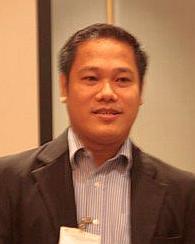Change starts with the youth, which is why Professor Eli Ricote, president of the Association of Schools of Public Administration in the Philippines (ASPAP), is passionate about introducing social accountability to public administration students.
Ricote, a senior public administration professor at the Jose Rizal University in the Philippines, presides over the activities of ASPAP, a network that has grown to include over a hundred academic organizations. He has been involved in ASPAP’s activities in the past five years, especially those that aim to improve public administration and governance instruction. Ricote is largely involved in the development of instructional materials, research, and faculty development, not only to benefit faculty, but other stakeholders working for good public administration and governance. This includes government agencies, local government units, and civil society organizations. His desire is to teach good governance not as a concept, but as a clearly defined process and goal. This stems not only from his commitment to his profession, but his personal commitment to working for good governance.
As such, ANSA-EAP’s desire to engage higher educational institutions in mainstreaming social accountability in the public administration curriculum personally resounds with him.
Ricote says there are clear synergies between ANSA-EAP and ASPAP. ANSA-EAP’s strategy to institutionalize action-oriented learning programs on social accountability perfectly matches ASPAP’s agenda. “It fits our curriculum on ethics and transparency perfectly. Our curricular programs to enrich public administration already has the tenets of social accountability, but is just called by a different name,” he says. The end-goal, however, is the same: good governance and improved delivery of government services to citizens.
ANSA-EAP’s initiative to pilot social accountability modules and integrate these into the curriculum of schools has been well received by educators, says Ricote. Five schools have implemented the program using various modalities—seminars, a topic within core courses, or as a special undergraduate course. Five other schools are in the process of integrating social accountability into their curriculum.
As an educator, Ricote appreciates how ANSA EAP “substantially enriched our programs by providing very good inputs and defining areas of teaching public administration.” This supports his personal aspiration to become a more effective educator. He acknowledges that the social accountability framework makes public administration more concrete in the minds of students —something that brings him, an educator, personal fulfillment. The briefings, workbooks, and trainer’s training provided by ANSA EAP are also very helpful, but Ricote says it is the “concept and framework of engaging partnerships that is truly valuable” especially since ASPAP works with schools that have their own networks.
Looking ahead, Ricote sees more areas of cooperation between ANSA EAP and ASPAP, especially as it pursues a faculty training program as part of its capacity development program.
ASPAP will be introducing social accountability as it carries on with its capacity development efforts using various platforms and in conjunction with other partners. He adds that ASPAP will be using ANSA EAP’s social accountability courses in its live courses on governance, which will be offered by beaming to local government units under a facility extended by the United Nations Development Programme (UNDP)—again demonstrating the synergies between ANSA EAP and ASPAP’s partners.
Through the partnership, ANSA EAP and ASPAP have been able to build the capacity for social accountability in a systematic and sustained way—which is important in building the foundation for good governance. For Ricote, being equipped with more tools makes him a more effective educator and conduit of good governance, not only to students, but to other educators like himself.

